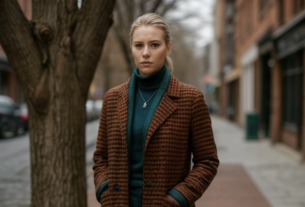Irina heard a knock at the door just as she was finishing the dinner dishes. Makar had gone to a friend’s place to study for exams; the apartment was quiet, drowsy in that almost-evening way. She wiped her hands on a towel and went to open the door, not really wondering who might be calling at half past seven.
A courier stood outside with an envelope.
“Are you Irina Vladimirovna Sokolova?”
“Yes, that’s me.”
“Please sign here.”
She signed, took the envelope, and closed the door. From the weight of the papers and the official font on the address alone, she knew there was nothing good inside. She sat down on the couch, tore the envelope open, and began to read.
Statement of claim. Division of marital property. Plaintiff — Dmitry Anatolyevich Sokolov.
Irina reread the first paragraph three times. The letters blurred before her eyes, refusing to arrange themselves into anything meaningful. Dima. Dima, who had vanished from her life two years ago. Dima, who seven years ago left for his pregnant lover and since then had only occasionally sent money for Makar, until he finally dissolved into thin air.
She set the papers on her knees and looked out the window. April darkness was thickening beyond the glass; a lone streetlamp lit the playground. Fifteen years ago she and Dima had walked there with little Makar, who’d swung on the swings squealing with delight. Dima would scoop him up and toss him in the air, and Irina would laugh and ask him to be careful.
Now Makar was grown. He was preparing to apply to university, dreaming of architecture. And Dima was sending, through the court, a demand to divide the car she had sold six months earlier and the apartment where they had lived together for twelve years.
It started when Dima began working late. Then there were business trips—one, then a second, then a third. Irina didn’t get suspicious right away. He worked for a construction firm and really did travel to sites often. But then she noticed that he came back from those trips with the wrong smell—not tobacco and construction dust, but someone else’s perfume, sweet and cloying.
She didn’t make a scene. One night, after Makar had fallen asleep and Dima was watching TV, she sat down beside him and asked:
“Do you have someone?”
He didn’t even look surprised. He looked at her for a long time—there was something like relief in his gaze—and he nodded.
“Yes.”
“For long?”
“A year. About that.”
Irina fell silent. Strangely, there was no pain. Just emptiness, cold and dull, like a courtyard after a blizzard.
“Do you love her?”
“I don’t know. Probably.”
“Is she pregnant?”
He flinched.
“How did you—”
“I can tell. You’ve changed. Guilty and somehow… elated at the same time.”
They sat on the couch until morning, barely speaking. Dima left a week later. He packed while Makar was at school, left the keys on the dresser, and said:
“I’ll help with money for Makar.”
“Alright.”
“Ira, I’m sorry.”
“Don’t. Just go.”
He left. The door closed softly, almost without a sound.
The first months were the hardest. Makar missed his father and didn’t understand why Dad no longer lived with them. Irina explained as best she could, not wanting to turn Dima into a villain but also unable to find the right words to make it less painful.
“Mom, will Dad come back to us?”
“I don’t know, honey. I don’t know.”
“Did he stop loving us?”
“No. He just… sometimes people need to live apart.”
Dima did help. Every month he brought money and saw Makar—at first often, then more rarely. Irina didn’t stand in the way. She didn’t file for child support, though her friends advised it. She felt that if Dima helped voluntarily, then there was still something human left in him, something she had once loved him for.
They split their savings evenly, without fights or mutual claims. Irina kept the apartment. Dima got the car, an old Skoda he hardly used. Six months later he offered:
“Take the car back. I don’t need it, and you could use it.”
Irina agreed. The car really was useful—driving Makar to practice, visiting her mother out in the province, not depending on public transport.
Five years later Dima disappeared. He simply stopped answering calls. His phone was silent; he didn’t respond to messages. Irina tried to find him through mutual friends, but no one knew anything. She decided not to insist. She figured he had a new life, a new family, and just wanted to wall himself off from the past. By then Makar hardly mentioned his father—not out of malice, but because their meetings had become so rare that Dima gradually turned into an almost unfamiliar person who sent money on holidays.
Two years ago, Irina realized it was time to think seriously about Makar’s future. University, prep courses, tutors—all of it required money. A lot of money. She worked as an accountant for a small trading company and earned a decent salary, but it clearly wasn’t enough for that kind of expense.
The car sat in the yard, barely used. Makar took the metro to class; Irina herself preferred public transport—parking downtown was expensive, and the nerves cost even more.
“Makar,” she said one morning at breakfast, “I want to sell the car.”
He lifted his head from his bowl of porridge and looked at her closely.
“Is it because of me? Because of school?”
“It’s because we don’t need the car. And we do need the money.”
“Mom, I can pick up a part-time job. Don’t sell it.”
“Honey, you need to prepare for exams, not tear yourself in two between studies and work. We’ll manage. I’ve already decided.”
The car sold quickly. A buyer turned up through a classifieds site, and they agreed on a price without much haggling. Irina put the money in a separate account set aside for Makar. She felt relieved—now there was a safety cushion; she wouldn’t have to panic if something went wrong.
And then the envelope arrived.
Irina called her friend Sveta, a lawyer by training though she now worked in marketing. Sveta arrived an hour later with a bottle of wine and a determined look.
“Show me,” she said, settling at the table.
Irina handed her the papers. Sveta read in silence, frowning deeper and deeper. Finally she set the documents down and looked at Irina.
“What nerve.”
“Sveta, I don’t understand. It’s been seven years. He gave me the car himself.”
“He’s demanding the division of marital property. He claims the car was acquired during the marriage, therefore it’s community property. You sold it without his consent, and now he wants compensation—half the value. Plus half the apartment.”
“But the apartment is mine!”
“I remember. But he asserts that a major renovation was done during the marriage using community funds, which means the apartment increased in value, and he has a right to part of that increase.”
Irina covered her face with her hands.
“Sveta, this is insane. Where has he been for seven years? Why now?”
“The statute of limitations for dividing property is three years from the moment a person learned of the violation of their right. Apparently he recently learned the car was sold and decided to act.”
“But why? What for?”
Sveta poured wine and slid a glass toward Irina.
“Money. It’s always money. Or revenge. Or a new woman whispering in his ear. Maybe all of the above.”
A week later was the preliminary hearing. Irina went with a lawyer Sveta had recommended. Dima sat across the aisle, and when she entered the courtroom, he turned and looked at her.
She almost didn’t recognize him. He’d aged, grown gaunt; there was an unhealthy yellowish tinge to his face. He was well dressed—a clearly expensive suit, a gleaming watch on his wrist. But his eyes were empty, tired.
A woman sat beside him. Young, about thirty, with bright lipstick and a cold gaze. She looked Irina up and down appraisingly, as if calculating the cost of her clothes and shoes.
The judge read out the statement of claim. Dima demanded compensation for the sold car in the amount of two hundred fifty thousand rubles and recognition of his right to one quarter of the apartment, taking into account the renovations. The total came to a substantial sum.
Irina’s attorney objected. He stated that the car had been transferred to the defendant by verbal agreement between the parties, that the plaintiff knew where it was and that it was being used, yet made no claims for seven years. As for the apartment, it had been purchased before the marriage, and the renovation was paid for with funds Irina had inherited from her grandmother, as confirmed by documents.
The judge scheduled the next hearing for a month later and suggested the parties try to reach a settlement.
After the session Dima caught up with Irina in the courthouse corridor.
“Ira, wait.”
She stopped and turned. He stood two steps away, fidgeting, unsure how to begin.
“I need money,” he said at last. “I really need it.”
“And so you decided to take the last of what belongs to your own son?”
“Not from my son. From you. That’s different.”
“No, Dima. It’s the same thing. I set the money from the car aside for his education. The apartment is his home. His future. You want to take his future away from him?”
“I have a right to my share. The law is on my side.”
“Where were you for seven years, when that law could have helped you earlier? Where were you for two years when you disappeared completely?”
He looked away.
“I had problems.”
“What problems, Dima?”
“None of your business.”
“It is now. Since you came with a lawsuit.”
He was silent for a moment, then sighed.
“Lena left. The one I… The child turned out not to be mine. She went back to her ex as soon as she gave birth. Turned out he was the father. I was left with nothing.”
Irina looked at him, and a strange feeling grew in her chest—not pity, not gloating, but a kind of heavy emptiness. Here he was, the man she had lived with for twelve years, the father of her son—and he was so foreign, so lost.
“I’m sorry,” she said. “Truly sorry. But that doesn’t give you the right to wreck Makar’s life.”
“I’m not wrecking anything. I just want what I’m owed.”
“And what are you owed, Dima? ‘My husband left me many years ago and now he’s come to divide the property’—that’s what it looks like. And you know what’s worst? You’re not even trying to justify yourself. You’re just hiding behind the law.”
“The law is the law.”
“The law is not a shield for meanness.”
She turned and headed for the exit. Behind her she heard:
“I won’t back down, Ira. I need this money. I really do.”
She didn’t look back.
At home Makar was waiting for her. He sat in the kitchen with his textbooks, but it was obvious he wasn’t studying. He stared out the window, his face grown-up and serious.
“How did it go?” he asked when Irina came in.
“Fine. The next hearing is in a month.”
“Mom, tell me honestly. Can we lose?”
She sat across from him and took his hand.
“We can. But we won’t.”
“He really thinks he has a right to the apartment?”
“He does.”
“And to the money from the car?”
“That too.”
Makar was quiet, squeezing her hand tighter.
“I saw him. Once. About two years ago. By chance, at the mall. He was with some woman. They were laughing, buying groceries. I wanted to go up to him but didn’t dare. I thought he had another life now, and I didn’t fit into it.”
“Makar…”
“I’m not mad, Mom. Really. It’s just strange that a person who forgot about you for seven years suddenly remembers when it’s about money.”
“People change. Not always for the better.”
“You didn’t change. You stayed the same.”
Irina hugged her son, pressing her face into his shoulder. When she gave birth to him he was so tiny, three kilos two hundred. Now he was a head taller than her, with strong arms, saying such right, grown-up things.
“We’ll manage,” she whispered. “We absolutely will.”
The lawyer worked thoroughly. He gathered every possible piece of evidence: messages, witness statements, bank statements, the apartment papers and inheritance documents. He found witnesses willing to confirm that Dima himself had given the car to Irina and that he hadn’t shown any interest in the property for years.
Sveta helped in the evenings, sorting documents and building a timeline. Makar offered silent support—making tea, setting the table, not prying, though it was clear he was worried.
A week before the hearing Irina got a call from an unknown number.
“Irina Vladimirovna? This is Alina. I’m a friend of Dmitry’s.”
Irina recognized the voice—the very same woman from the courtroom.
“I’m listening.”
“I’d like to meet with you. To talk.”
“About what?”
“About Dima. About the situation. Maybe we can find a compromise?”
“I don’t think we have anything to discuss.”
“Please. It’s important.”
Irina agreed more out of curiosity than any desire to negotiate. They met at a café not far from Irina’s work. Alina arrived exactly on time, ordered a cappuccino, and sat across from her.
“Thank you for coming,” she began.
“Go ahead. I don’t have much time.”
“Dima’s in a difficult situation. He took out a loan and started a small business. It didn’t take off. Now there’s debt. The bank is demanding repayment.”
“And what exactly am I supposed to do?”
“Help. You were close once.”
Irina gave a short laugh.
“Close? He left me seven years ago. Disappeared for two. And suddenly remembered me when he needs money. You call that close?”
“I understand your resentment, Irina Vladimirovna. But Dima really is in trouble. If you agree to a settlement, pay at least part, it would help a lot.”
“And who’s going to help Makar? Who will pay for his education? You?”
Alina pressed her lips together.
“I’m offering a reasonable compromise. You pay half the car’s value; we drop the claims on the apartment. Dima withdraws the suit.”
“No.”
“Think it over. Court can drag on. Nerves, time, attorney’s fees.”
“I’m ready to go all the way.”
“You’re stubborn.”
“I’m protecting my son. That’s called motherhood, not stubbornness. You wouldn’t understand.”
Alina stood, left money for her coffee on the table.
“You’ll regret this,” she said. “Dima won’t back down.”
“Neither will I.”
The hearing was tense. Dima represented himself without a lawyer; he spoke incoherently, stumbled, cited bits of statutes, but it was clear his grasp of the law was weak. Irina’s attorney methodically dismantled his arguments, submitted evidence, and called witnesses.
A former neighbor recalled how Dima himself had brought the car over and left the keys with Irina. A coworker confirmed that Irina had never hidden where the car was and that Dima could have taken it back at any time but chose not to. Bank statements showed the apartment renovation was paid from the account where proceeds from the sale of her grandmother’s house had been deposited.
The judge listened carefully, asked questions, took notes.
When it was Irina’s turn to speak, she stood and looked at Dima.
“I don’t want revenge,” she said. “I don’t even want to accuse anyone. But I will not allow my son’s future to be taken away just so someone can cover debts that arose from his own irresponsibility. ‘My husband left me many years ago and now he’s come to divide the property’—it sounds absurd. For seven years he showed no interest in me or in what was happening to the so-called jointly acquired property. And when he needed money, he remembered his ‘rights.’ That’s not a right. That’s an attempt to take advantage of the kindness I showed by not filing for child support and not forcing support through the courts. I hope the court will see what’s fair and make the right decision.”
The judge announced a recess to render a decision.
They sat in the corridor—Irina, Sveta, and Makar. The lawyer had stepped out to make a call and promised to return for the reading. Makar held his mother’s hand in silence. Sveta nervously scrolled through social media.
Dima stood by the window, alone. Alina had left during the break without waiting for the end. He looked lost, older. Irina suddenly thought that in some parallel universe they were still together and happy, raising their son, with no Lena, no lawsuits, no pain.
But in this universe things were different.
They were called back into the courtroom. The judge read the decision: the plaintiff’s claims were denied in full. The plaintiff had not proved any violation of his rights, had missed the statute of limitations, and had provided no convincing evidence that the defendant had abused her rights by selling the car. The apartment, purchased before the marriage and renovated with the defendant’s personal funds, was not marital property.
Dima listened in silence, without emotion. When the judge finished, he stood and walked out without looking back.
Irina caught up to him outside. She didn’t know why—she just felt she needed to.
“Dima.”
He stopped and turned.
“What do you want? To savor your victory?”
“No. I want to understand. Why did you do this? Really—why?”
He looked at her for a long time, then sighed.
“I don’t know. Alina said it was my right. That I had a right to a share. It seemed like a way out.”
“A way out of what?”
“Out of what my life has become. I thought money would help me start over. Buy an apartment, open a business. Become somebody.”
“You already were somebody, Dima. You were a father. A husband. You chose to walk away from that.”
“I know.”
“And? Did money help you become somebody?”
He shook his head.
“No. It only made me even more pathetic.”
They stood in silence. People passed by, hurrying about their business. Spring sun broke through the clouds, laying uneven patches of light across the sidewalk.
“I’m not asking for your forgiveness,” Dima said. “I just wanted you to know. I didn’t mean to hurt you both. Makar. You. I just… got lost.”
“I’m not forgiving you,” Irina replied. “But I’m not holding a grudge either. You made your choice. Now live with it.”
He nodded, turned, and walked away. She watched him until he disappeared around the corner.
That evening she and Makar sat in the kitchen, drinking tea with the cookies Sveta had brought to celebrate the victory. Dusk thickened outside the window; a geranium blossomed on the sill.
“Mom,” Makar said. “I’m proud of you.”
“Why?”
“Because you didn’t give up. You could’ve agreed to a compromise, paid something, closed the issue. But you fought. For us. For our future.”
Irina smiled and placed her hand over his.
“I will always fight for you, honey. Always.”
“I know. And when I grow up, when I have my own family, I’ll remember this. I’ll be the same.”
“Be better. Don’t repeat other people’s mistakes.”
“I’ll try.”
They sat in silence, sipping tea, and Irina thought about how strange life is. It takes one thing but gives another. It took a husband but left her a son. Took illusions but gave strength. Took peace but gave the ability to fight.
And maybe that’s what happiness is—not the absence of pain, but the ability to pass through it and remain yourself.
A year passed. Makar got into university and was studying architecture, just as he’d dreamed. Irina was promoted at work and started saving for a down payment on a small car—having your own vehicle really was convenient.
She heard nothing more about Dima. Once Makar said he’d seen a photo of him on social media—he had moved to another city and was working at a branch of the same construction firm where he’d started. Things with Alina, judging by the looks of it, hadn’t worked out.
Irina didn’t gloat. She simply accepted it as fact. He built his life the way he could. That was his problem now, not hers.
She was building her own. With Makar. Brick by brick, day by day, slowly but steadily. And this life was honest, clean, without lies



